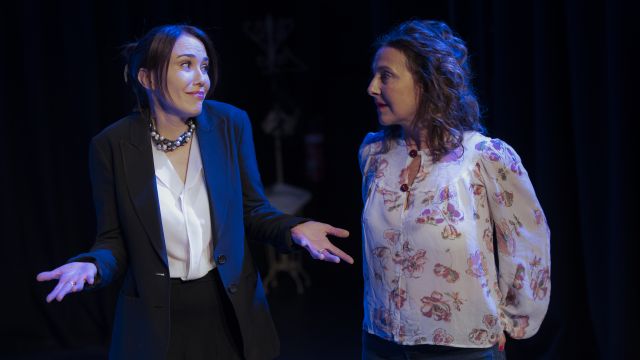Unsolicited Male
Q44 is one of Melbourne’s most interesting and bold independent theatre companies. After lockdowns that meant they were closed for over two years, they now return at a changed venue and with a revival of one of their most successful productions to kick things off.
Below is the review of Unsolicited Male that I wrote in 2018 - with one amendment. Q44 regular Anthony Scundi now plays Noah, the ‘life coach’. Otherwise, this remount retains all the qualities of the play’s initial outing. On the 2022 opening night, there was a lot of laughter, but also a lot of sighs and groans of recognition.
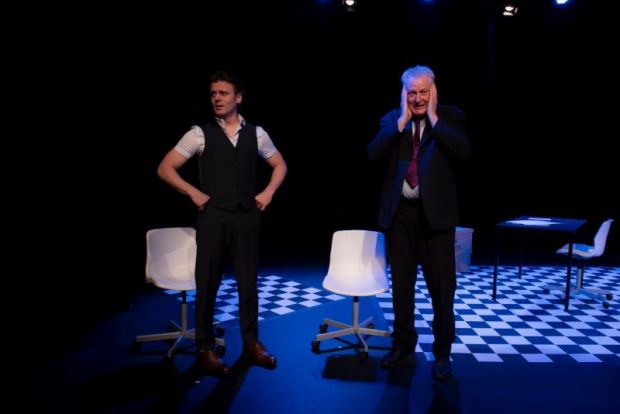 Images above of the 2022 cast by Jodie Hutchinson.
Images above of the 2022 cast by Jodie Hutchinson.
Images below from the 2018 production by Michael Teo.
My review from 2018:
This concise, focussed and beautifully executed play is – by accident or design – as timely as possible in the context of the #MeToo phenomenon. But don’t think that Unsolicited Male (that title maybe is a little too cute) is a pamphlet or a piece of agit-prop. As Ron Elisha says in his (2018) program note, ‘Theatre can only ask the questions.’
Wendy (Kym Valentine) has worked for Zeke (Russell Fletcher) for two years. She’s still wounded by a relationship break-up and has circumscribed her life down to work, her small apartment, and a pet goldfish. Zeke, now a single dad of two girls, is still wounded by his divorce. Two lonely, sad people. The beginning of a blighted ‘office romance’? One night, after both working late, Zeke invites Wendy for dinner at a restaurant. It’s ‘the least he can do’, given how hard she works… Conversation is awkward: these two hardly know each other, although Zeke is eager to talk, to share some pain and grievance. Wendy is more guarded. But circumstances conspire: Zeke drives Wendy home… and she invites him in for a coffee… You can see already the various ways in which these events so far can be interpreted.
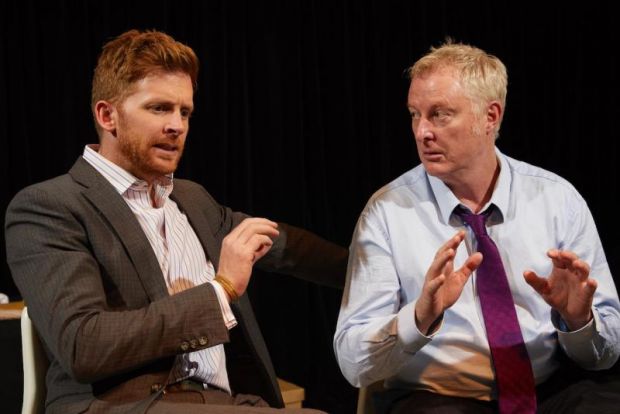
And it’s interpretation, really, that’s the point. In particular, what is the nature of consent? But if that’s all there is to it, there wouldn’t be much to it. Instead, Mr Elisha adds exponents of two kinds of polar opposite interpretation. Chelsea (Gabriella Rose-Carter) is Wendy’s sister. She takes what we might call a ‘feminist position’, which in this case, is simplistic, judgemental, cut, and dried, black and white, and without a shred of sympathy for Zeke or her sister Wendy. (‘He’s your employer, Wendy!”)
At the other extreme is Zeke’s ‘life coach’, Noah (Anthony Scundi), a loud, gung-ho peddler of ‘masculinist’ certainties – and in his way as simplistic as Chelsea and just as unsympathetic to either party. (‘Oh, mate – all the signs are there - she’s into you! You scored. High five!’)
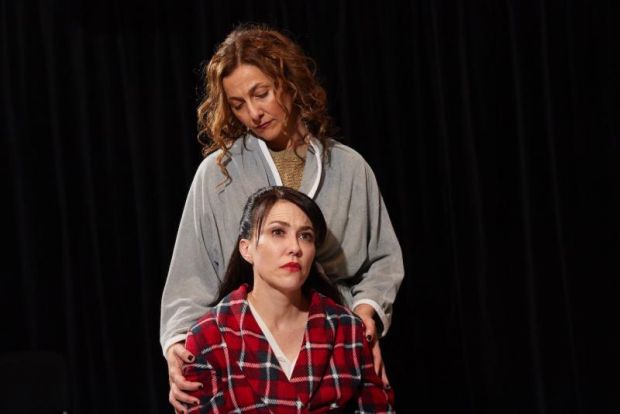
But the no-fat text is even cleverer than that. Interpretation and judgement begin before we have seen the incident in question – let alone its aftermath – for ourselves. The play operates on and between two timeframes: Wendy and Zeke’s present – the office, the restaurant, Wendy’s apartment, and the office again – and Chelsea’s and Noah’s wildly differing but unnuanced commentary. As for Zeke and Wendy, they’re far more ambivalent. After all, they were there that night and Chelsea and Noah were not. There’s a welter of feelings. Wendy’s humiliated and kicking herself. Zeke would even plead guilty to Chelsea’s charges against him. “He took advantage!’ she insists. ‘What if I took advantage?’ Zeke wonders.
Director Suzanne Heywood elicits sympathetic and funny performances, and skilfully stages proceedings on a narrow transverse stage. In the centre is the office, the restaurant and Wendy’s kitchen. At either end, Chelsea and Noah attack, judge, build resentment, blame, or encourage, bolster and wipe doubt away.
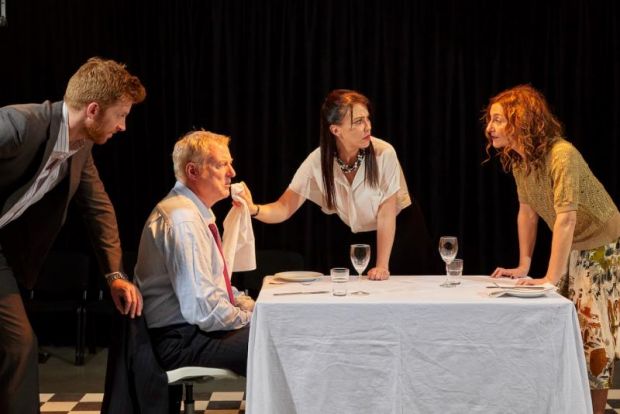
Ms Valentine’s Wendy is a layered performance: she has a thin carapace of efficiency and polite evasion but underneath there’s a misery that leaves her uncertain and vulnerable. Mr Fletcher’s Zeke is equally vulnerable: pervaded by his shattered self-esteem and self-pity, he makes the mistake of thinking this woman can save him… Of course, he found Wendy attractive when he hired her. Yes, he did notice her cleavage… He’s a man. At the other end, Chelsea says all the ‘right’ or ‘correct’ things, but in Ms Rose-Carter’s hands we soon come to squirm at her abstract dogmatism. Mr Seymour’s Noah certainly scores the most laughs, but if I have one reservation it’s that he’s so gung-ho, so enthusiastic in his clichés that it’s almost as if he’s in another play. Meanwhile, Will Atkinson, often a strong feature of Q44 productions, here plays a snotty waiter in the restaurant scenes.
I’d be curious to hear, say, Helen Garner’s or Germaine Greer’s reactions to this scenario. Ms Garner might be swayed by sympathy for Zeke, who is, after all, no Harvey Weinstein but a truly pathetic schlub of a figure. Is he a predator or did he just make wrong assumptions and a clumsy blunder? Ms Greer might ask why Wendy didn’t just tell him to ‘f**k off? But, since she didn’t, get over it, darling. Even if ‘getting over it’ means that things have changed – irrevocably.
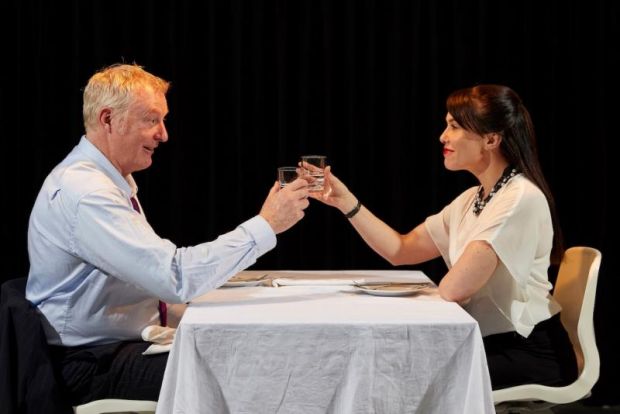
We leave the theatre weighing interpretations. Was he in love with her? Or could she have been anybody? Was she too sympathetic for her own good – and to a man she didn’t find attractive at all – until it was too late to say no? Or is it ever too late to say no? These are real questions, for our time, maybe for all times, but here presented in such slick, funny, and concentrated form that we are held, entertained, and made thoughtful.
Michael Brindley
Subscribe to our E-Newsletter, buy our latest print edition or find a Performing Arts book at Book Nook.

